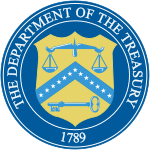
The Federal Reserve System is the central banking system of the United States. It was created on December 23, 1913, with the enactment of the Federal Reserve Act, after a series of financial panics led to the desire for central control of the monetary system in order to alleviate financial crises. Over the years, events such as the Great Depression in the 1930s and the Great Recession during the 2000s have led to the expansion of the roles and responsibilities of the Federal Reserve System.

The United States secretary of the treasury is the head of the United States Department of the Treasury, and is the chief financial officer of the federal government of the United States. The secretary of the treasury serves as the principal advisor to the president of the United States on all matters pertaining to economic and fiscal policy. The secretary is, by custom, a member of the president's cabinet and, by law, a member of the National Security Council.

The Department of the Treasury (USDT) is the national treasury and finance department of the federal government of the United States, where it serves as an executive department. The department oversees the Bureau of Engraving and Printing and the U.S. Mint. These two agencies are responsible for printing all paper currency and minting coins, while the treasury executes currency circulation in the domestic fiscal system. The USDT collects all federal taxes through the Internal Revenue Service; manages U.S. government debt instruments; licenses and supervises banks and thrift institutions; and advises the legislative and executive branches on matters of fiscal policy. The department is administered by the secretary of the treasury, who is a member of the Cabinet. The treasurer of the United States has limited statutory duties, but advises the Secretary on various matters such as coinage and currency production. Signatures of both officials appear on all Federal Reserve notes.

His Majesty's Treasury, occasionally referred to as the Exchequer, or more informally the Treasury, is a ministerial department of the Government of the United Kingdom. It is responsible for developing and executing the government's public finance policy and economic policy. The Treasury maintains the Online System for Central Accounting and Reporting, the replacement for the Combined Online Information System, which itemises departmental spending under thousands of category headings, and from which the Whole of Government Accounts annual financial statements are produced.

The treasurerof Australia, also known as the Federaltreasurer or simply the treasurer, is the minister of state of the Commonwealth of Australia charged with overseeing government revenue collection, federal expenditure and economic policy as the head of the Department of the Treasury. The current treasurer is Jim Chalmers, who was selected by Prime Minister Anthony Albanese in May 2022 following the 2022 Australian federal election.
A financial analyst is a professional, undertaking financial analysis for external or internal clients as a core feature of the job. The role may specifically be titled securities analyst, research analyst, equity analyst, investment analyst, or ratings analyst. The job title is a broad one: in banking, and industry more generally, various other analyst-roles cover financial management and (credit) risk management, as opposed to focusing on investments and valuation; these are also discussed in this article.

The Federal Home Loan Mortgage Corporation (FHLMC), commonly known as Freddie Mac, is a publicly traded, government-sponsored enterprise (GSE), headquartered in Tysons, Virginia. The FHLMC was created in 1970 to expand the secondary market for mortgages in the US. Along with its sister organization, the Federal National Mortgage Association, Freddie Mac buys mortgages, pools them, and sells them as a mortgage-backed security (MBS) to private investors on the open market. This secondary mortgage market increases the supply of money available for mortgage lending and increases the money available for new home purchases. The name "Freddie Mac" is a variant of the FHLMC initialism of the company's full name that was adopted officially for ease of identification.

The Under Secretary of the Treasury for Domestic Finance is a high-ranking position within United States Department of the Treasury that reports to, advises, and assists the Secretary of the Treasury and the Deputy Secretary of the Treasury. The under secretary leads the department's policy on the issues of domestic finance, fiscal policy, fiscal operations, government assets, government liabilities, and other related economic and fiscal matters.

The Under Secretary of the Treasury for International Affairs is a high-ranking position within United States Department of the Treasury that reports to, advises, and assists the Secretary of the Treasury and the Deputy Secretary of the Treasury on international economic issues and is often referred to as the U.S. Treasury’s top economic diplomat. As of January 13, 2023, the under secretary is Jay Shambaugh.

The Department of the Treasury, also known as The Treasury, is the national treasury and financial department of the federal government of the Commonwealth of Australia. The treasury is responsible for executing economic and fiscal policy, market regulation and the delivery of the federal budget with the department overseeing 16 agencies. The Treasury is one of only two departments that have existed continuously since Federation in 1901, the other being the Department of the Attorney-General.
The Office of Financial Institutions (OFI) is an agency of the United States federal government in the United States Department of the Treasury. OFI coordinates the department's efforts regarding financial institutions legislation and regulation, legislation affecting Federal agencies that regulate or insure financial institutions, and securities markets legislation and regulation. The office coordinates the department's efforts on financial education policy and ensuring the resiliency of the financial services sector in the wake of a terrorist attack.
The Office of Fiscal Service (OFS) is an agency of the United States federal government in the United States Department of the Treasury. The office is led by the Fiscal Assistant Secretary of the Treasury. The Fiscal Assistant Secretary reports to the United States Secretary of the Treasury through the Under Secretary of the Treasury for Domestic Finance.

In September 2008, the Federal Housing Finance Agency (FHFA) announced that it would take over the Federal National Mortgage Association and the Federal Home Loan Mortgage Corporation. Both government-sponsored enterprises, which finance home mortgages in the United States by issuing bonds, had become illiquid as the market for those bonds collapsed in the subprime mortgage crisis. The FHFA established conservatorships in which each enterprise's management works under the FHFA's direction to reduce losses and to develop a new operating structure that will allow a return to self-management.
James B. Lockhart III is an American U.S. Navy officer, business executive, and, since September 2009, Vice Chairman of WL Ross & Co, which manages $9 billion of private equity investments, a hedge fund and a Mortgage Recovery Fund. It is a subsidiary of Invesco, a Fortune 500 investment management firm. He coordinates WL Ross's investments in financial services firms and mortgages. Lockhart serves co-chairs the Bipartisan Policy Center's Commission on Retirement Security and Personal Savings.

Mary John Miller is an American government official and political candidate who served as Under Secretary of the Treasury for Domestic Finance and a former Acting Deputy Secretary of the Treasury. In 2020, she announced her candidacy for Mayor of Baltimore but lost to Council President Brandon Scott in the June 2020 Democratic primary. She was also a director of Silicon Valley Bank, the second biggest bank to go bankrupt in US history.
According to statute, the Fiscal Assistant Secretary is appointed by the United States Secretary of the Treasury. The Fiscal Assistant Secretary is the highest ranking career official in the Department of the Treasury. The Fiscal Service, which the Fiscal Assistant Secretary heads, includes the Bureau of Government Financial Operations (which since 1984 has been known as the Financial Management Service and the Bureau of the Public Debt.
Edward Joseph DeMarco is an American government official who served as the acting director of the Federal Housing Finance Agency (FHFA), the conservator for Fannie Mae and Freddie Mac, from 2009 through 2014. According to DeMarco, FHFA's mandate from Congress is to preserve and conserve the assets of Fannie Mae and Freddie Mac. "[I]n their current state that translates directly into minimizing taxpayer losses. We are also charged with ensuring stability and liquidity in housing financing and maximizing assistance to homeowners."

The Ministry of Finance, abbreviated MOF, is a ministry of the Government of Malaysia that is charged with the responsibility for government expenditure and revenue raising. The ministry's role is to develop economic policy and prepare the Malaysian federal budget. The Ministry of Finance also oversees financial legislation and regulation. Each year in October, the Minister of Finance presents the Malaysian federal budget to the Parliament.

Christopher Campbell is a senior executive-level business strategist, former American political aide, and senior government official who previously served as Assistant Secretary of the Treasury for Financial Institutions. He was unanimously confirmed as Assistant Secretary by the United States Senate in 2017. Prior to assuming his Department of Treasury role, Campbell was the majority staff director for the United States Senate Committee on Finance and a senior staff member on the United States Senate Committee on the Judiciary.

The Deputy Under Secretary / Designated Assistant Secretary of the Treasury for International Finance is a senior position within the United States Department of the Treasury responsible for advising the Secretary of the Treasury on matters of international finance and economic coordination, and overseeing U.S. participation in international financial institutions. The Assistant Secretary is appointed by the President and confirmed by the Senate. The office is currently held by Brent Neiman.












